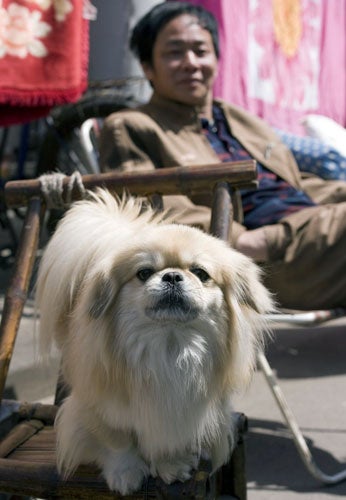Pet owners dismayed at China's one-dog law
Anger at policy to fight spread of rabies and regulate pet industry

The residents of Guangzhou, one of China's most affluent cities, are already used to sticking to the country's strict one-child rule, but a new regulation is about to force many dog owners to make an impossible decision.
From next month, new regulations will come into action meaning households will be allowed only one dog, meaning anybody with two or more pooches will be allowed to keep only their favourite.
The rule is apparently being brought in as a response to the city's stray dog problem, as a way to prevent the spread of rabies and regulate the pet industry. Pets were considered a bourgeois affectation and banned in the time of Chairman Mao, but have now increased in popularity.
Guangzhou – in the south of the country – is a wealthy city, and as the middle class has grown so has the number of dog owners. The result of many having dogs for the first time is that the pets are often abandoned, and this problem has been increased by owners failing to neuter their pets. Next year the city will host the Asian Games, and authorities are attempting to improve its appearance before the event.
Similar rules are in place in many other Chinese cities, including Beijing. But some people – including a veterinarian at a pet hospital in Guangzhou's Haizhu district – claim that the introduction of the one-dog rule will result in more pets being abandoned on the street. "The hospital cannot take in more pets," the vet, who would identify himself only as Mr Zhang, told the China Daily.
Mao Mao, the founder of a stray dog's shelter, says that since the regulation was announced in March, they now receive 10 calls a day from owners looking to get rid of a pet. "I'm afraid there are going to be many more stray dogs in July when the one-dog regulation becomes effective," she told the Associated Press.
Dog-owners have reacted with anger to the new rule. "These dogs are like family. How can you keep one and get rid of the others?" said Mrs Chen, a middle-aged housewife from Guangzhou. Mrs Chen is the owner of two dogs – a Pekingese mix and a terrier mutt – and would not give her full name because she feared that she might be traced by authorities who would then take one of her dogs.
Rabies is a major problem in China. The country's Ministry of Health says it has the second highest rate in the world after India. About 35,000 dogs have already been killed in a cull in the Shaanxi province, after an increase in the number of rabies cases. The cull, which started last month, was ordered by the city of Hanzhong and has caused much anger among animal-lovers in the country.
Shi Ruihua, a government official, said that "dog-beating" teams had been ordered to kill any dogs they found on the street, even if the dogs had registered owners. He told The Wall Street Journal that the method of execution was chosen because it was the most practical, and that 360,000 dogs in the countryside surrounding the city were to be vaccinated.
Too bourgeois for Mao: The rise of China's designer dogs
They were prohibited under the regime of Chairman Mao for being too bourgeois, but since the ban was lifted, pets have surged in popularity in China – even if you can still find dog meat on some restaurant menus.
Dogs are becoming so pampered that there are even a number of designers specialising in pet fashion. Hu Xi, who set up her studio in 2000 and now has a small factory in Beijing, makes around 10,000 yuan (£895) a month during the winter. "When my dogs go out they always wear shoes and they change clothes every day," Hu told Reuters. But strict rules on dog ownership remain in force. In 2006, Beijing banned dogs in public places. There is also a ban on any dog over 14 inches in the city, and informers who turn in oversized animals get a reward.
Dog meat is often eaten in the winter months because it is believed to warm the blood, while the penis is regarded as an aphrodisiac. However, in the build-up to the Beijing Olympics last year, the 112 official restaurants were told to take dog meat off their menus in order to avoid offending tourists. The Olympics were not all good news for dogs though – there was also a massive cull of pets in the lead-up to the Games.
Join our commenting forum
Join thought-provoking conversations, follow other Independent readers and see their replies
Comments
Bookmark popover
Removed from bookmarks